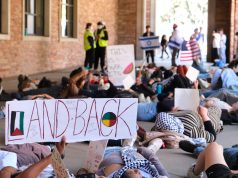This time, the same-sex marriage wars will unfold in the city’s federal building, just a short walk from where
Now, the legal fight over gay marriage shifts into unprecedented
territory with the first trial ever held over the constitutionality of
a state’s ban on the right of same-sex couples to wed.
Over the next few weeks, Chief U.S. District Judge
ban on same-sex marriages. To most legal experts, the trial may lay the
groundwork for eventually propelling the gay marriage issue to the
And those experts say the stakes in the Proposition 8 showdown are
immense for the entire gay rights movement if Perry v. Schwarzenegger,
as the
“It’s a dangerous ballgame, because if it does go to the
— seeking the right to marry. To overturn Proposition 8, the group
attracted widespread attention by turning to conservative legal power
broker
The Proposition 8 campaign is defending the law. Gov.
The epic fight in Walker’s courtroom will largely be
a battle of dueling academics and experts on the subject of marriage,
child-rearing, discrimination against gays and other social issues. In
the end, to prevail, the plaintiffs must prove that Proposition 8
violates the U.S. Constitution’s equal protection clause by targeting
gays and lesbians without any government justification for excluding
them from
marriage rights. And Proposition 8 supporters are going to have to back
up their claim that the state should reserve marriage to heterosexual
couples mainly because of what they say is the procreative purpose
behind marriage.
The lawsuit also targets the two-tiered system of marriage that now exists in
in upholding Proposition 8 last year, left intact more than 18,000 gay
marriages licensed before Proposition 8 went into effect. Those
marriages took place after the
struck down the state’s prior ban on gay marriage under the California
Constitution, a ruling wiped off the books by Proposition 8.
The current lawsuit raises claims under the U.S. Constitution, which the state
The plaintiffs plan to produce evidence Proposition
8 was motivated by bias against gays and lesbians and stems from a
history of discrimination against the gay community. The plaintiffs’
witness list includes a host of professors of history, economics,
psychology and sociology who will testify on the importance of marriage
and the impact of a marriage ban on same-sex couples. The witness list
includes other figures, such as
The plaintiffs also plan to call key figures in the
Proposition 8 campaign to grill them about their effort to outlaw gay
marriage. “There’s a lot of ugly stuff out there we’ll be putting into
evidence,” said
On the flip side, Proposition 8’s defenders will
present experts they say will show why the state has a right to
restrict the definition of marriage to heterosexual couples. The
defense says the central reason for upholding Proposition 8 is its role
in “regulating naturally procreative relationships between men and
women to provide for the nurture and upbringing of the next generation.”
Defense groups also say the trial is important for the dozens of states that have passed laws outlawing gay marriage.
“I think the biggest issue in this case is whether
or not we respect the right of the people to make social choices
through the democratic process,” said
Same-sex couples across the state, meanwhile, hope the trial moves toward settling a question that has roiled
“Having the same options and choices available as anyone else seems like a no-brainer,” said
who married just days before Proposition 8 passed. “But I don’t think
this is going to be resolved for a long time. Whatever happens, the
other side is going to keep fighting it as far as they can.”
What the trial is about
Same-sex couples argue that Proposition 8’s ban on
gay marriage violates the equal protection clause of the U.S.
Constitution, depriving them of the same rights heterosexual couples
have under
law. The plaintiffs will argue that Proposition 8 was driven by bias
against gays and lesbians, is not backed by any government interest,
and is part of a history of discrimination against the gay community.
The defense will put on evidence it says shows such a law is a valid
attempt to preserve traditional marriage.
What’s at stake in the trial
Everyone from the judge to legal experts has predicted the Proposition 8 trial could lay the groundwork for the
The legal process is almost certain to stretch well
into 2011. In the meantime, barring a change at the ballot box, it is
doubtful there will be any change in
status quo: Same-sex marriages licensed before Proposition 8 went into
effect will remain valid, while the law’s ban on more gay weddings
stays in force.
Key players in the Proposition 8 trial
The judge: Chief U.S. District
It is no small irony that the veteran
judge has inherited perhaps the most important gay rights case of this
era. His original nomination to the federal bench by former President
and has since become anything but a predictable conservative in his
20-year career. A staunch libertarian, he’s presided over everything
from one of
The outcome of the Prop 8 trial with Walker is
anybody’s guess. This buttoned-down Republican once publicly came out
in favor of legalizing drugs. His view of Prop 8 may well turn on how
he balances his dislike of government regulation in private lives with
his deference to a state’s right to enforce its laws.
Plaintiffs attorneys:
Former U.S. Solicitor General under President
conservative lawyers in the country. His decision to be one of the
central lawyers in the challenge to Prop 8 was a coup for gay rights
advocates seeking the right to marry for same-sex couples. Many legal
experts believe his mere presence on the legal team will aid any chance
of the case eventually succeeding in the
The liberal yin to Olson’s yang on the Prop 8 legal team, Boies is one of the most prominent trial lawyers in
Defense attorney:
A former assistant Attorney General during the Reagan administration, Cooper is part of the same conservative
The plaintiff couples:
Perry and Stier have been in a relationship for nine
years, and are the parents of four boys. Perry is executive director of
a state agency called First 5 California, while Stier is an information
executive with an
temporarily issued marriage licenses. Katami and Zarrillo have been
together eight years, and have been trying to marry the past two years.
The state bystanders:
Gov.
Schwarzenegger and Brown will be ghosts in the Prop 8 trial, as neither is defending the
ban on gay marriage now embedded in the state’s constitution.
Schwarzenegger has remained neutral, despite the fact the case is
titled Perry v. Schwarzenegger. Brown, meanwhile, has declared that he
believes Prop 8 is unconstitutional, prompting Prop 8 supporters to try
to get him switched to the plaintiffs’ side. The judge refused, but
Brown’s position lends heft to the legal challenge.
—
(c) 2010, San Jose Mercury News (San Jose, Calif.).
Visit MercuryNews.com, the World Wide Web site of the
Distributed by McClatchy-Tribune Information Services.














































